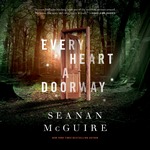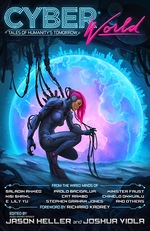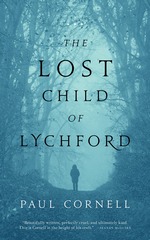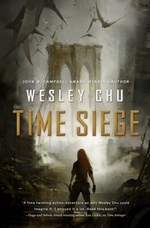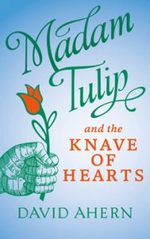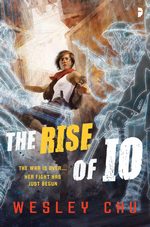by Wesley ChuA
Series: Io, #1eARC, 352 pg.
Angry Robot, 2016
Read: September 27 – 29, 2016

“Stick with me, kid ,” he said. “We’ll introduce you to a bigger world with all sorts of new people who will want to kill you.”
Let me start by saying that while this is a sequel to the Tao Trilogy (taking place a couple of decades after The Rebirths), you don’t have to have read them to enjoy this. You’ll miss some nuances, not understand some references and will spoil events in books that you’ll end up wanting to have read. But, it’s not essential — and this would be a great jumping-on point. If you’ve read the Tao Trilogy, let me assure you that this is a worthy successor, just as fun — a part of the same series, but it feels fresh enough that you don’t feel like you’ve read this book before.
Ella Patel lives in an Indian slum — in part of the world hardest hit by the war between the Quasing factions and their human allies (while I feel bad for these fictional Indians, I’m so glad to see alien combat not centered in the U.S.). She lives on her own, orphaned by circumstance and a Gengix attack — between her small size, quick wit and almost all-consuming greed she lives life on her own terms, two steps ahead of the law and one step ahead of criminals she’s wronged. I could’ve read at least 100 pages more of her antics before we introduced a single Quasing from either side and been entirely content (not a complaint about when we got Quasings, however), Ella’s just instantly likeable in a way that no one in these series has been (with the possible exception of Cameron).
Io’s host is in India doing some off-the-books investigating into one of the Gengix’s most ambitious projects yet. That investigation doesn’t go so well and suddenly Io needs a new host — there’s the impetuous woman who tried to help her host nearby (and a much better option than anyone else), so Io makes a choice and the Queen of the streets becomes so much more. Their relationship defines rocky initially (see Tao and Roen, but worse).
It should be obvious (but isn’t) that not every Quasing will have had as illustrious existence as Tao — Io’s haven’t developed a martial art, conquered legendary kingdoms, etc. Which isn’t to say that Io didn’t leave her mark on history — for example, I trust the name “The Maginot Line” rings a bell.
As the minutes ticked by, Io clarified some of the dreams of her glorious career inhabiting humans. If anything, it comforted Ella that the Quasing weren’t all-knowing and powerful, that they were just as culpable and mistake-prone as any human.
Nevertheless, just by having existed for a few millennia on earth, Io’s got a lot of wisdom and experience to pass on to her new host. Slowly — and with several appeals to her mercenary streak — Io convinces Ella to begin training to become a Prophus agent. Eventually, Ella begins to make a sort of peace with her new life partner and something approaching friendship begins to develop.
Incidentally, Ella’s not the only one comforted by a not-all-that-perfect Quasing.
Meanwhile, a couple of Gengix Adonis agents are vying for control over India — with the citizenry of the slum (and the nation, really) acting as pawns. Shula is one of the more lethal women you’ll come across — both politically and physically. She’s not one you want to cross in almost any situation — but that doesn’t stop many.
At some point, Prophus agents come to town and everything gets turned upside down — Ella finds a desire to help the Prophus, Shula seized the opportunity for personal power, and Io has her chance at doing something that’ll leave her mark on history.
The fight scenes (training and otherwise) are up to Chu’s pretty high standards, the humor is crisp, the characters (including a couple of old friends) are just right, and the plots are among his best — I just don’t know how else to put this. The book was a solid winner and had me eager for the next installment, and then Chu hits us with one of the best Epilogues that I can remember, making me more than eager for whatever’s next (not really sure what the word for “more than eager” is, eager squared?).
Great characters, twists, suspense and grins — I dug this one so much. He keeps the magic of the Tao books, reinvigorates it and expands it. I expected Chu to deliver just what fans wanted without it being a case of “second verse, same as the first,” I just didn’t expect it’d be this good. Get on this one, folks.
Disclaimer: I received this eARC from Angry Robot via NetGalley in exchange for this post — thanks to both for this.
N.B.: As this was an ARC, any quotations above may be changed in the published work — I will endeavor to verify them as soon as possible.
—–

